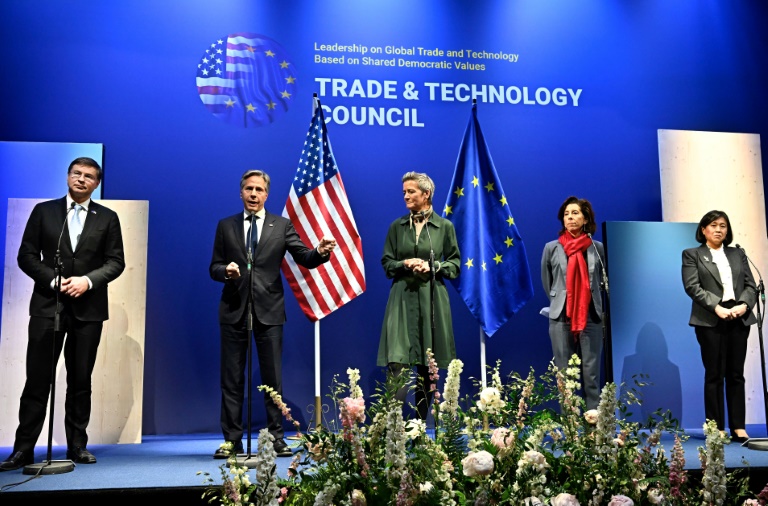The European Union and the United States said Wednesday that they would soon release a voluntary code of conduct on artificial intelligence, hoping to develop common standards among democracies as China makes rapid gains.
Both political and technology industry leaders have been warning of the growing risks as AI takes off, with potentially wide-ranging effects on privacy and other civil liberties.
After talks with EU officials in Sweden, US Secretary of State Antony Blinken told reporters that Western partners felt the “fierce urgency” to act and would ask “like-minded countries” to join the voluntary code of conduct.
“There’s almost always a gap when new technologies emerge,” Blinken said, with “the time it takes for governments and institutions to figure out how to legislate or regulate”.
European Commission Vice President Margrethe Vestager added that a draft would be put forward “within weeks”.
“We think it’s really important that citizens can see that democracies can deliver,” she said.
She voiced hope “to do that in the broadest possible circle — with our friends in Canada, in the UK, in Japan, in India, bringing as many onboard as possible”.
Sam Altman, whose firm OpenAI created the popular ChatGPT bot, took part in the talks of the Trade and Technology Council between the EU and the United States, hosted this year in the northern Swedish city of Lulea.
The forum was set up in 2021 to try to ease trade frictions after the turbulent US presidency of Donald Trump but has since set its sights largely on artificial intelligence.
In a joint statement released by the White House and the European Commission, the two sides called AI a “transformative technology with great promise for our people, offering opportunities to increase prosperity and equity”.
“But in order to seize the opportunities it presents, we must mitigate its risks,” it said.
It added that experts from the two sides would work on “cooperation on AI standards and tools for trustworthy AI and risk management”.
They also discussed how to work together on sixth-generation mobile technology, an area in which Europeans have taken an early lead.
– China concerns –
The EU has been moving forward on the world’s first regulations on AI, which would ban biometric surveillance and ensure human control of the technologies, though the rules would not enter into force before 2025 at the earliest.
China has also discussed regulations but Western powers fear that Beijing, with its growing prowess in the field and willingness to export to fellow authoritarian countries, could effectively set global standards.
While concerns have risen about China in the European Union, the bloc as a whole has yet to take as assertive a stance as the US has, with French President Emmanuel Macron recently leading a major business delegation to the world’s second-largest economy.
But Blinken played down differences between the US and European positions on China, saying that “None of us are looking for a Cold War”.
“On the contrary, we all benefit from trade and investment with China, but as opposed to de-coupling, we are focused on de-risking,” he said.
– Rising wonder of AI –
The United States has made no serious effort to rein in AI despite rising calls for regulation, including by some in the tech industry.
Technology leaders, including Altman, warned in a joint statement Tuesday that AI could put the world at risk without regulation.
“Mitigating the risk of extinction from AI should be a global priority alongside other societal-scale risks such as pandemics and nuclear war,” they wrote.
ChatGPT burst into the spotlight late last year as it demonstrated an ability to generate essays, poems and conversations through minimal input.
Hoping to demonstrate both the strengths and risks of AI, Danish Prime Minister Mette Frederiksen on Wednesday delivered a speech to parliament partly written by ChatGPT.
“Even if it didn’t always hit the nail on the head, both in terms of the details of the government’s work programme and punctuation… it is both fascinating and terrifying what it is capable of,” she said.
The Computer and Communications Industry Association, which represents major technology firms, in a statement welcomed the “heightened, pointed transatlantic engagement” on AI at the meeting in Sweden.
But it reiterated its opposition to any EU fees or actions against foreign tech companies.

 Business4 months ago
Business4 months ago
 Business5 months ago
Business5 months ago
 Events3 months ago
Events3 months ago
 People4 months ago
People4 months ago
 Events6 months ago
Events6 months ago
















